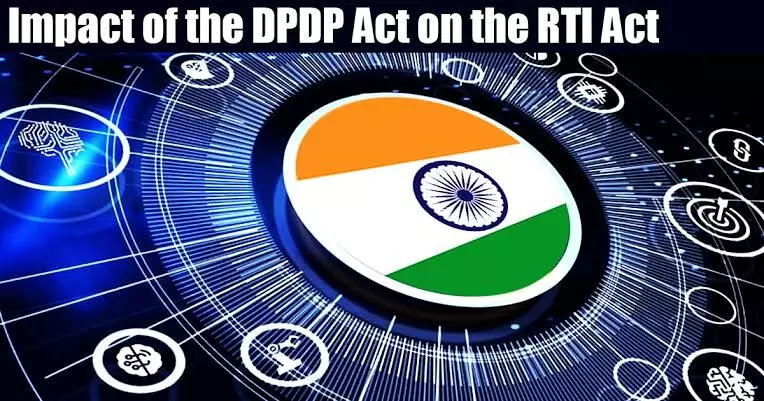DPDP Act: Eroding the Spirit of RTI and Undermining Transparency

The Digital Personal Data Protection Act, 2023 (DPDP Act), hailed as a landmark for privacy rights, has also stirred debates around its impact on transparency and accountability mechanisms, particularly the Right to Information (RTI) Act, 2005. Passed amidst growing concerns over data breaches and misuse, the DPDP Act seeks to regulate the processing of personal data and ensure that citizens' privacy is upheld. However, one of its provisions has left whistleblowers, activists, and transparency advocates alarmed.
The contentious provision lies in Section 44(3) of the DPDP Act, which amends Section 8(1)(j) of the RTI Act. Earlier, the RTI Act enabled the disclosure of personal information if it served a larger public interest, allowing whistleblowers to access critical data about public officials and governmental decisions. This provision was instrumental in unearthing corruption and inefficiency, holding those in power accountable. By broadening the exemption of personal data from disclosure, the DPDP Act effectively removes this clause, shielding public officials from scrutiny and silencing voices that dare to question authority.
At its core, the RTI Act was designed to empower citizens, providing a tool to demand information from the government and its institutions. It emerged as the backbone of transparency, aiding whistleblowers who often operated at great personal risk to expose malpractice. From the Adarsh Housing Scam to the Vyapam Scandal, RTI inquiries have played a pivotal role in bringing such issues to light. With the DPDP Act's amendment, this democratic empowerment is severely curtailed, as even information pertaining to individuals in public positions can now be withheld under the guise of privacy.
Critics argue that this move contradicts the fundamental principles of governance and democracy. The RTI Act was not intended as a vehicle for breaching privacy but rather a mechanism to ensure accountability. Legal experts emphasize that privacy protection should not come at the cost of transparency. The right to know, particularly about public servants and government actions, is essential to ensure fair governance. By prioritizing privacy excessively, the DPDP Act risks shielding wrongdoings and eroding public trust.
The DPDP Act's critics also highlight its potential misuse by those in power. Without the safeguard of public interest disclosure, the provision could be used to withhold information even in cases of corruption or abuse of authority. Whistleblowers, who often rely on RTI applications to access crucial documents, may find their efforts stifled, forcing them into legal battles to seek transparency. This could deter individuals from raising their voices against injustice, compromising India's democratic ethos.
Another concern is the timing of the DPDP Act's passage. India has witnessed growing demands for privacy protection amidst a global data-driven economy, and the government has touted the DPDP Act as a solution to safeguard citizens' data. However, the simultaneous weakening of the RTI Act raises questions about the government’s intentions. Transparency and privacy should coexist as complementary pillars of democracy, but the DPDP Act appears to prioritize one at the cost of the other.
Activists and opposition leaders have been vocal about the potential consequences of these amendments. They argue that the exemption of personal information from RTI requests undermines the very essence of accountability. Congress MP Rahul Gandhi, for example, described the DPDP Act as a "blow to democracy," warning that it could shield corrupt practices and hinder efforts to expose malpractice. These concerns reflect a growing apprehension among citizens about the erosion of their rights to information.
Moreover, the amendment risks creating a chilling effect on public discourse. Whistleblowers who previously relied on RTI inquiries to uncover corruption may now face insurmountable barriers. This could lead to a decline in investigative journalism, as reporters struggle to access documents that were once within their reach. As transparency fades, the space for constructive criticism and citizen engagement diminishes, leaving the government less accountable.
While the government defends the DPDP Act as a necessary step to protect privacy, its critics argue that the law should have been designed with a nuanced approach. Striking a balance between privacy and transparency requires careful deliberation and consultation, ensuring that one does not undermine the other. The DPDP Act’s broad exemptions fail to achieve this balance, risking a loss of trust in institutions and governance.
The Digital Personal Data Protection Act, 2023, may represent progress in terms of privacy rights, but its implications for the RTI Act are deeply concerning. By curtailing the right to access information under the pretext of privacy, the DPDP Act threatens the mission and spirit of the RTI Act, which has long been a cornerstone of transparency and accountability in India. Whistleblowers and activists, who form the backbone of democratic checks and balances, stand to lose the most. As debates continue, it remains to be seen whether the government will address these concerns or allow the DPDP Act to erode the legacy of RTI. For a democracy that thrives on its citizens’ voice, the stakes could not be higher.
